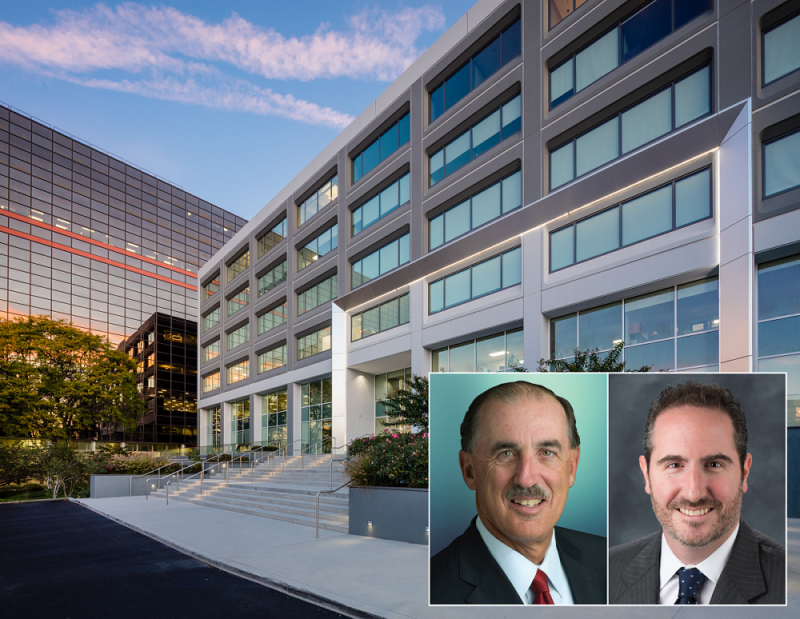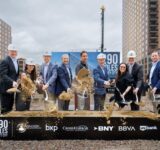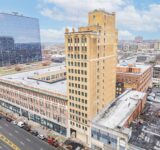A fund affiliated with CBRE Global Investors recently sold Park 80 West, a 510,000-square-foot office complex in Saddle Brook, for a rumored $115.5 million after acquiring the property in 2015 and completing nearly $15 million in upgrades. CBRE’s tristate institutional properties team brokered the sale of the property, which also serves as CBRE’s New Jersey headquarters. Inset: CBRE Vice Chairman Jeff Dunne (left) and Executive Vice President Jeremy Neuer lead the capital markets group in New Jersey.
By Joshua Burd
The demand for a modern workplace and high-end amenities has tested the strength of New Jersey’s office market, where more than two-thirds of all space was built before 1990.
Jeff Dunne and Jeremy Neuer know that all too well, but have seen many aging buildings come back to life under the guidance of creative, well-heeled developers and investors.
“There are some amazing, talented people,” said Dunne, a vice chairman with CBRE. “Some are great at ground-up, some are great at taking a property and just bringing it to another level — and what ends up happening is they attract a better, typically higher-credit tenant.”
The veteran brokers have also seen the windfall that can come from selling such a property. As the co-leaders of CBRE’s capital markets team in New Jersey, Dunne and Neuer have spearheaded a host of high-profile office sales in recent months, often involving buildings that are newly upgraded and newly stabilized after trading just two or three years earlier.
They’ve done so while leveraging CBRE’s vast platform and their own individual backgrounds to complete deals and source new opportunities in the office sector and elsewhere.
“When you put all that together, it helps us to drive the process for our clients,” said Neuer, an executive vice president, who joined the capital markets team last year.
Led by Dunne, a 37-year veteran of the firm, the tristate institutional properties group includes 15 members and covers all asset classes within two hours of Manhattan. But the firm’s most recent work in New Jersey has been headlined by large office sales, including both value-add deals and so-called core deals involving up-to-date, stabilized properties.
In the last three months alone, the team has inked the sale of well-known properties such as Park 80 West in Saddle Brook and Country Club Plaza in Paramus. The former — a two-building, 510,000-square-foot complex — changed hands in August for a reported $115.5 million, more than $40 million above the price that a fund affiliated with CBRE Global Investors paid for the asset in early 2015, in a sale that was also brokered by Dunne’s team.
During the three and a half years between the transactions, the investment group raised occupancy to 92 percent from 73 percent and saw rents increase by more than 28 percent — thanks largely to a sweeping set of upgrades to the property’s common areas and amenities.
Onyx Equities and Garrison Investment Group completed a similar strategy at Country Club Plaza, a 304,000-square-foot complex, which they acquired in August 2016 for $32.5 million. After representing the seller at the time, CBRE also represented Onyx and Garrison when they sold the revamped property for a rumored $74 million.
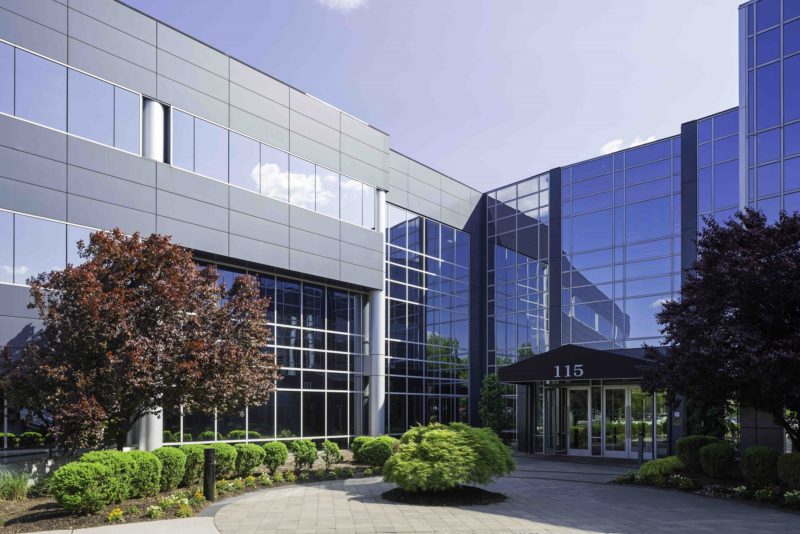
In both cases, Dunne said the investors added value by creating the modern, inspiring work environments that tenants were seeking. That allowed them to hand off the properties to another type of investor — one that was seeking the in-place stability created by the new improvements and new leasing.
“And it’s all about distributing cash flow because they’re buying it fully baked,” Dunne said. “They expect some safety in it with credit, with term, and it’s going to tie to the financing.”
The age of New Jersey’s office stock has unlocked that opportunity in the current cycle. And Dunne and Neuer say there are still deals in the pipeline, noting that several other buildings sold between roughly 2014 and 2016, where investors are now wrapping up their efforts to improve and stabilize the buildings.
“Some bought to fix and hold, but I would say a lot of them bought to fix and sell,” Dunne said, pointing, for instance, to several noncore, suburban office buildings that Mack-Cali Realty Corp. has sold in recent years. “And you’ll see eventually that a lot of those buildings, I think, will be upgraded with significant capital investment and then they’ll be resold.”
Based in Saddle Brook, the team navigates those deals by drawing on decades of experience: Dunne has focused on investment sales for nearly all of his 37 years with CBRE, having completed more than $30 billion of transactions during that time.
Neuer, who spent 19 years as a leasing broker in New Jersey, uses that knowledge when advising sellers and evaluating properties.
“I can ask him about any submarket and any buildings and he doesn’t have to go look it up,” Dunne said. “He’s just responding because it’s like the back of his hand.
“And he has a different perspective — (such as) ‘Why would this building be vacant versus another? What do they need to do to make it better?’ — because he’s looked at how to successfully fill buildings.”
RELATED: Repositioned office campus in Bridgewater sells for $46 million
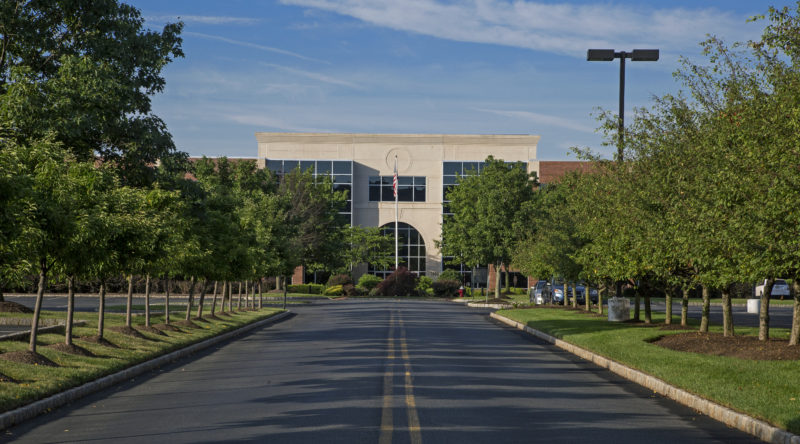
It also helps to have a full-service platform and the resources of the world’s largest real estate services firm. Neuer said he interacts with CBRE’s leasing brokers every day “because inevitably, I hear something that’s going on in the market that’s going to help one of our clients make money.” That could include news that a tenant is considering a building for which the capital markets team has performed a valuation, he said, or where the team is advising a would-be seller.
Both brokers believe that knowledge and CBRE’s access to data give it an edge in the industry.
“Better knowledge and better information, we think, lead to better results,” Dunne said. For instance, the team may have a client that will hold off on selling a building in hopes of landing a tenant that is in the market, but “we’ll do our homework” and realize that it’s highly unlikely.
“It’s hugely valuable, because when people are making a $50 million, $100 million or $200 million investment, no one wants to make a mistake,” Dunne said. “They want to feel that they really know ‘Why did that tenant go here? Why did the tenant go somewhere else? Why did they move out?’ And we can walk them through that.”
Leveraging the platform can also mean using CBRE’s vast property management team to analyze a building’s operating expenses and find savings for a landlord. That can help the economics of the deal for buyers and sellers, Dunne said, while often resulting in new business for the firm’s asset management division.
The same is true for CBRE’s other service lines.
“All we’re trying to do is be accretive to our clients, whether it be through the leasing knowledge, whether it be through the expenses through our management folks, whether it be through the debt if it’s going to play an instrumental role in the deal,” Dunne said. “That could be in the proceeds, that could be in the interest rate.”
Equally critical is technology. Neuer — who is a known advocate for innovation in commercial real estate — brought those insights when he was named co-leader of the firm’s capital markets group in New Jersey in 2017. And while he has taken an interest in how forces such as big data, driverless cars and the internet of things will impact the industry in the long term, he also relies on tech on a daily basis, such as touring a building with his iPad in hand and being able to retrieve comps from CBRE’s cloud-based database.
All of those assets — from CBRE’s scale and platform to its use of technology — allow the team to both be efficient and find solutions for clients, which Dunne feels is at the core of the brokerage business. He also notes that “a lot of buyers are looking for a reason to pay less,” so problem-solving and sound underwriting are all the more important.
“We won’t go to a client or potential client and pump up a number just to get an assignment,” Neuer added. “We will walk in the door having tried to solve all the problems on the front end that we can, especially if it’s complex.”
Full service
Through mid-November, CBRE’s tristate institutional properties team had closed $2.4 billion worth of office and industrial transactions since the start of 2016, part of nearly $5 billion in overall volume.
That means the team has also seen its share of retail and multifamily deals. In the former category, Dunne said opportunities are less common, but still fruitful.

“I think people are a little more reluctant to sell retail because it’s been hit over the head pretty hard,” Dunne said. “We’re selling a bunch, but some owners just won’t sell into a market where 98 out of 100 articles are very negative on retail.”
Yet the team’s retail practice remains healthy, Dunne said. Led by CBRE Senior Vice President David Gavin, CBRE has closed 23 retail deals totaling nearly $1 billion going back to 2016. That includes the $53 million sale last May of a grocery-anchored, 153,000-square-foot shopping center in Edison, and the firm has several other properties coming to market in 2019.

The team’s multifamily practice, led by Senior Vice President Gene Pride, is also set to market a large mix of garden and luxury apartment properties across New Jersey, Long Island and southern Connecticut starting next year. The tristate capital markets group has inked two dozen multifamily deals with a combined value of $1.5 billion since 2016.
Neuer, who oversees the team’s office and industrial practice in New Jersey, said there is at least one common theme among the asset classes, despite the fact that they often have different types of buyers.
“It really comes down to who’s providing a great experience, and those are the people that are winning in the market,” Neuer said. “Those are the people that are able to exit whatever product type they’re in at big numbers.”

